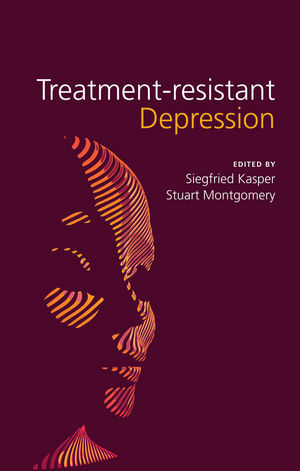
Treatment-Resistant Depression - Kasper / A. Montgomery

Descripción
Descripción completa de: Treatment-Resistant Depression - Kasper / A. Montgomery
Author : Kasper / A. Montgomery
Language: English
Finishing : Paperback, 228 pages
ISBN : 978-1-119-95290-9
Edition Number: 2013
Description:
Successful management of patients with treatment-resistant depression is going to require a thorough understanding of the biological basis for both the depression and its failure to respond to standard treatments. This book clearly and succinctly summarizes the latest scientific research and its applications in clinical practice.
A first step is a clear definition of what constitutes treatment-resistant depression so that clinical trials and other studies are using common criteria, enabling comparison and meta-analysis of their outcomes. The opening chapter reviews definitions and predictors of originating from different fields and discusses their usefulness in clinical practice and clinical research. The next chapter proposes a new definition, adapting terminology from medicine.
Biological classification requires identification of genetic risk factors: with gene variants accounting for 50% of the variance in the clinical outcomes of antidepressant treatments this is clearly a fruitful area of research. Chapter 3 describes several genes already associated with treatment-resistant depression and, while further work is needed to translate findings into clinical recommendations, predicts that genetic prediction of TRD could became a widespread clinical reality within a few years.
Most patients with TRD will be treated pharmacologically and three chapters review the latest evidence for pharmacological best practice, including switching strategies for antidepressants, the role of antipsychotics and augmentation strategies to complement lithium.
There are two major alternatives to pharmacotherapy: neuromodulation and psychotherapy. The brain intervention chapter summarizes clinical research and experience with electroconvulsive therapy, transcranial magnetic stimulation, vagus nerve stimulation, deep brain stimulation and magnetic seizure therapy. The final chapter reviews the literature pertaining to the effectiveness of various forms of psychotherapy in patients who have not responded to antidepressant pharmacotherapy, revealing that patients who have not responded to one or two trials of antidepressant medication have a 30%-50% chance of responding to a focused psychotherapy. It proposes indications for psychotherapy in TRD and summarizes general therapeutic principles.
Table Of Contents:
- List of Contributors vii
- Foreword ix
- 1 Definitions and Predictors of Treatment-resistant Depression 1
- Daniel Souery and William Pitchot
- 2 Treatment-resistant Depression: A Separate Disorder – A New Approach 21
- Hans-Jürgen Möller, Florian Seemüller, Rebecca Schennach and Ramesh K. Gupta
- 3 Genetics of Treatment-resistant Depression 43
- Chiara Fabbri, Stefano Porcelli and Alessandro Serretti
- 4 Is There a Role for Switching Antidepressants in Treatment-resistant Depression? 91
- Stuart Montgomery
- 5 The Role of Atypical Antipsychotics in Inadequateresponse and Treatment-resistant Depression 107
- Siegfried Kasper and Elena Akimova
- 6 Lithium, Thyroid Hormones and Further Augmentation Strategies in Treatment-resistant Depression 129
- Robert Haußmann and Michael Bauer
- 7 The Role of Nonpharmacological Interventions in Treatment-resistant Depression 159
- Thomas E. Schläpfer and Sarah Kayser
- 8 The Role of Psychotherapy in the Management of Treatment-resistant Depression 183
- Michael E. Thase
- Index 209
Author Information:
Professor Dr Kasper is Professor of Psychiatry and Chairman of the Department of General Psychiatry at the Medical University of Vienna, Austria. He is Honorary Professor at the University of Hong Kong, China. He concentrates on the biological bases of mental disorders and their possible treatment approaches. He has conducted studies in psychopathological as well as clinical areas. Dr Kasper is a frequent national and international speaker and is actively involved in research programmes studying depression, anxiety, psychosis, and dementia, authoring over 800 research reports and reviews. Dr Kasper serves on the editorial boards of numerous learned journals, including European Archives of Psychiatry and Neuroscience, European Psychiatry, and European Neuropsychopharmacology. He is Co-editor in-chief of the International Journal of Psychiatry in Clinical Practice.
Professor Montgomery was Professor of Psychiatry at Imperial College, University of London until his retirement in 1996 when he became Emeritus Professor of Psychiatry. He has great breadth of experience in the field of psychotropic medicine with seminal work in depression, anxiety disorders, suicide prevention and schizophrenia. He has published 26 books and more than 400 papers. Professor Montgomery is editor of International Clinical Psychopharmacology and was editor of European Neuropsychopharmacology for 20 years. He also serves on the editorial board of numerous scientific journals.
Puedes encontrar este libro tambien en las siguientes categorías

































Valoración: